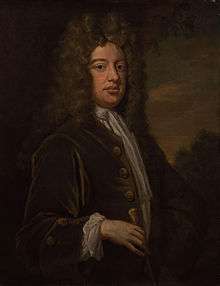William Walsh (poet)

William Walsh (6 October 1662 – 15 March 1708)[1] was an English poet and critic, son of Joseph Walsh of Abberley Hall, Worcestershire.
Life
He entered Wadham College, Oxford, as a gentleman commoner in 1678. Leaving the university without a degree, he settled in his native county, and was returned MP for Worcestershire in 1698, 1701 and 1702. In 1705 he sat for Richmond, Yorkshire. On the accession of Queen Anne he was made "gentleman of the horse," a post which he held till his death, noted by Narcissus Luttrell on 18 March 1708.
He wrote a Dialogue concerning Women, being a Defence of the Sex (1691), addressed to "Eugenia"; and Letters and Poems, Amorous and Gallant (preface dated 1692, printed in Jonson's Miscellany, 1716, and separately, 1736); love lyrics designed, says the author, to impart to the world "the faithful image of an amorous heart."
It is not as a poet, however, but as the friend and correspondent of Alexander Pope that Walsh is remembered. Pope's Pastorals were submitted for his criticism by Wycherley in 1705, and Walsh then entered on a direct correspondence with the young poet. The letters are printed in Pope's Works (ed. Elwin and Courthope, vi. 49-60). Pope, who visited him at Abberley in 1707, set great value upon his opinion. "Mr Walsh used to tell me," he says, "that there was one way left of excelling; for though we had several great poets, we never had any one great poet that was correct, and he desired me to make that my study and my aim."
The excessive eulogy accorded both by Dryden and Pope to Walsh must be accounted for partly on the ground of personal friendship. The life of Virgil prefixed to Dryden's translation, and a "Preface to the Pastorals with a short defence of Virgil, against some of the reflections of Monsieur Fontenella," both ascribed at one time to Walsh, were the work of Dr Knightly Chetwood (1650–1720). In 1704 Walsh collaborated with Sir John Vanbrugh and William Congreve in Monsieur de Pourceaugnac, or Squire Trelooby, an adaptation of Molière's farce. Walsh's Poems are included in Anderson's and other collections of the British poets.
See The Lives of the Poets, vol. iii. pp. 151 et seq., published 1753 as by Theophilus Cibber.
References
- ↑ James Sambrook, ‘Walsh, William (bap. 1662, d. 1708)’, Oxford Dictionary of National Biography, Oxford University Press, 2004; online edn, Oct 2005.
Sources
 This article incorporates text from a publication now in the public domain: Chisholm, Hugh, ed. (1911). "Walsh, William". Encyclopædia Britannica. 28 (11th ed.). Cambridge University Press.
This article incorporates text from a publication now in the public domain: Chisholm, Hugh, ed. (1911). "Walsh, William". Encyclopædia Britannica. 28 (11th ed.). Cambridge University Press. Ward, Adolphus William (1899). "Walsh, William (1663-1708)". In Lee, Sidney. Dictionary of National Biography. 59. London: Smith, Elder & Co.
Ward, Adolphus William (1899). "Walsh, William (1663-1708)". In Lee, Sidney. Dictionary of National Biography. 59. London: Smith, Elder & Co. - Sambrook, A. J. "Walsh, William (bap. 1662, d. 1708)". Oxford Dictionary of National Biography (online ed.). Oxford University Press. doi:10.1093/ref:odnb/28620. (Subscription or UK public library membership required.)
External links
- Works by William Walsh at LibriVox (public domain audiobooks)

| Parliament of England | ||
|---|---|---|
| Preceded by Thomas Foley Edwin Sandys |
Member of Parliament for Worcestershire 1698–1701 With: Sir John Pakington, Bt |
Succeeded by William Bromley Sir John Pakington, Bt |
| Preceded by William Bromley Sir John Pakington, Bt |
Member of Parliament for Worcestershire 1702–1705 With: Sir John Pakington, Bt |
Succeeded by William Bromley Sir John Pakington, Bt |
| Preceded by Wharton Dunch Thomas Yorke |
Member of Parliament for Richmond (Yorks.) 1705–1707 With: Thomas Yorke |
Succeeded by Parliament of Great Britain |
| Parliament of Great Britain | ||
| Preceded by Parliament of England |
Member of Parliament for Richmond (Yorks.) 1707–1708 With: Thomas Yorke |
Succeeded by Harry Mordaunt Thomas Yorke |
| Court offices | ||
| Preceded by Henry Ireton |
Gentleman of the Horse 1702–1708 |
Succeeded by Thomas Meredith |